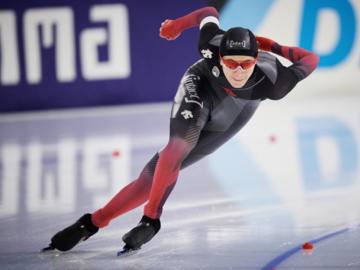Feb. 22, 2021
Improvisation helps UCalgary speedskaters slide into medals

With the Olympic Oval at the University of Calgary under repair and the World Cup season approaching, Canadian speedskaters needed to find suitable ice.
So they made trips to Red Deer where they practised on an outdoor track. The men's team also skated on the frozen surfaces of Gap Lake and Ghost Lake, west of Calgary.
That wasn't the end of their improvising.
When WinSport's Canadian Sport Institute, adhering to COVID-19 protocols, closed its doors, the Calgary-based racers were forced to take their dryland training elsewhere.
For Jordan Belchos, that meant working out in the parking garage of his condo complex. Connor Howe heaved weights and kettlebells in the backyard of his house. When the snow started to fly, he lugged his gear into the basement.
Isabelle Weidemann, keen to make up for the shortfall of on-ice access, simply devoted more time to running and cycling.
"Obviously, it's been such a weird season," says Weidemann, a geology student in the Faculty of Science at UCalgary. "I tried to do the best I could at continuing normal training. I've had to be quite resourceful."
Unprecedented times demanded an unconventional approach. And, despite the chaos, the speedskaters made it work.
UCalgary's three athletes brought home three medals apiece from Heerenveen, Holland. During a five-week bubble stay, Jan. 12 to Feb. 15, the Canadian squad competed in two World Cup events and the World Speed Skating Championships.
"Goals were a tricky thing to set because of all the time off-ice," says Belchos, who, with Ted-Jan Bloemen and Howe, earned two silver medals and a bronze in the men's team pursuit. "I wanted to go there to do as well as I could."
Arriving home early last week and now observing 14-day quarantines, Howe, Belchos and Weidemann say the winter's experience — adjusting to change, seeking alternatives, making do — was an education.
"Man, I learned so much about training — how it doesn't have to be so rigid," says Weidemann, who, with Ivanie Blondin and Valérie Maltais, collected two gold medals and a silver in the women's team pursuit.
You can deviate from these regimented plans and be creative in how you get stuff done. That's been a big eye-opener for me ... and something that'll relieve a lot of stress.
Even so, the Canadians jumped at the chance for 10 days of traditional preparation — indoor ice, stocked weight rooms — when they arrived in the Netherlands in January. Following that training block, they finally got to race — two weekends of World Cup action, down from the usual five, plus the World Championships, all staged in the Heerenveen hub.
"We were pretty excited," says Belchos, an urban studies student in the Faculty of Arts. "Ecstatic is a little bit of an exaggeration — but not really. Everyone was really happy."
With the bubble came restrictions. Skaters could leave the hotel for walks and bike rides, but they weren't permitted to stop in anywhere. Belchos describes it as "strict, within reason." Participants were tested weekly for the coronavirus. Masks, except while eating or skating, were mandatory.
Perhaps the biggest adjustment? The bleachers at Thialf Oval, typically packed with 12,000 screaming fans, sat empty. "That was one of the weirdest things," says Belchos. "But you're still surrounded by the best skaters in the world."
Which was not lost on Howe. Thanks to the quality of competition there, the 20-year-old knows his team-pursuit medals are meaningful. In his mind, of course, are the 2022 Olympics in Beijing.
"That's the big goal, for sure," says Howe, a mathematics student in the Faculty of Science. "Based on the results I achieved, I have motivation. I have an idea of what to shoot for."
Something everyone is shooting for? A stretch of normalcy after this season's upheaval, even if the Canadians did prove that they could handle turmoil.
"I feel proud of the team and of myself for just continuing to make things work," says Weidemann. "Every time we had a setback, we would re-assess, 'OK, what can we do?' It was the weirdest season ever, but I definitely feel like it's made me a stronger athlete and it's made the team stronger, too."










